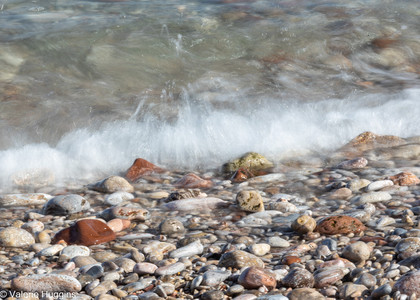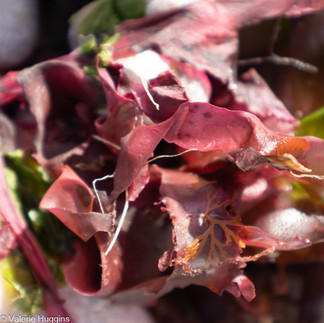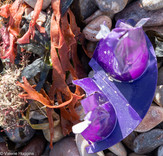Letting go of Winter, emerging into Spring
- valeriehuggins0
- Mar 7, 2024
- 6 min read
Over the past few days, with a gap in the rain and the sun starting to feel a little bit warmer, I have been out exploring. Keen for change to go with the new season, I have deliberately travelled to local places that I had not been to before. Letting go of a little of the familiar, the taken-for-granted. And as usual when I do this I learned some more about myself.
I started my walk at Broadsands beach, with its expanse of flat sand, rows of beach huts, coffee shops and dog walkers. The sea was calm, and I spotted several common gulls along with a cormorant and a small egret. I was surprised to see some swans though! I watched the scene in front of me, with the views across Torbay, my spirits lifted.

A short walk along the South West Coast Path up and over the hill

and I came to Elberry Cove. A world away from the bustle of Broadsands.

Deep blue tranquil sea, sparkling wavelets gently lapping onto the pebbly shore, a myriad of coloured stones. The line of dark seaweed and jetsam marking the tide's reach. The surrounding steep cliffs and woodland enclosed the space and added to that feeling of seclusion and being away from and apart from the world.
My guidebook Wild Swimming Walks: Dartmoor and South Devon, tells me It was one of Agatha Christie's favourite bathing spots. At the far side of the cove is the remains of Lord Churston's bath hut that it used to have an early version of a hot tub, with a fire heating up the seawater! How good would it be to restore that!

I sat on the pebbly beach, and took a deep breath. Peace. There were just a few other people. Three were changing after their swim and another was just about to go in. I was envious but keenly aware that the water at about 10°C needs to be a tad warmer before I will brave it! Just a few more weeks though and that pleasure awaits. Research shows that a cold dip leads to an endorphin high that raises one's mood and elates the senses, as well as boosting the immune system. The swimmers certainly seemed energised, I could hear their laughter across the cove.
I took out my camera and started to take some images to try to capture the beauty of this little cove and I spotted some different colours of seaweed on the tideline:
But in among the jetsam were several bits of plastic! I took a couple of photos and then started to pick them out.
Immediately I was shaken from my delight at having found this new place to explore. I was back into my anger and despair at what we are doing to our world. The day before I had read an article written last Autumn "We are afraid': Scientists issue new warning as world enters 'Uncharted Climate Territory'. The report stated that rising global temperatures, diminishing sea ice and more extreme weather are signs that human activity is “pushing our planetary systems into dangerous instability.” "Such instability, they warn, means that in this century as many as 6 billion of the Earth’s almost 8 billion people could find themselves in regions that are no longer habitable due to climate impacts such as extreme heat and dwindling food supplies." They go on to note that there is minimal progress being made by governments around the world. And the plastic pollution is both a consequence and driver of climate change. Not only is the plastic waste harmful to the wildlife that live in or around our rivers and seas, as it breaks down it releases greenhouse gases.
I hear a voice behind me - "I see you're doing what I am!" A guy with a litter pick and a bag who was patiently scouring the seaweed. We talked for a while and he shared that he does this every day as he goes for his walk. Turning the anger into action.
Going back to my guidebook to find my route, I found out that in the summer 'there is a water-ski lane here, with boats churning up the water above the eelgrass beds, which are a breeding ground for seahorses'. The anger rose again!
Back to my wander. I reluctantly left Elberry Cove and headed up into the Elberry and Marridge woods following the South West Coast Path signs. When I looked back, the guy was still picking up the plastic:

The path was exceptionally muddy after the weeks of rain, and the going was hard.

The glimpses of the sea through the trees were heartening though, as was the sight of Churston Cove, despite the long descent down the steps.

Another beautiful spot to sit and rest. I could see the end of the breakwater in Brixham. And once again the colours and textures of the pebbles and seaweed in the crystal clear water caught my eye and I immersed myself in creating images that would capture this magic.
Soon it was time to move on though. I decided to go on into Brixham for a bite of lunch. I got a bit lost and cross with myself for not following the guide book route back to Broadsands, but the views across the harbour at Brixham were worth it.
The town was really busy, such a contrast to the quiet of the coves and yet so near. By the time I caught the bus back to Broadsands, the sky had clouded over and I headed home. I reflected on the adventure, patting myself on the back for taking an unknown route and seeking out new experiences.
As I compiled this blog, I remembered my response to the jet skis impact on the seagrass, and did some further research. I was pleased to discover that all the seagrass beds in Torbay are now protected by the Ocean Conversation Trust's Blue Meadow Project! At Broadsands the seagrass bed has grown by 29 per cent and has now merged with the one at neighbouring Elberry Cove and covers 240 acres! I also learned that:
Seagrass harbours five times as many fish as bare seabeds; it's a nursery for juveniles. So it's brilliant for biodiversity, as well as the local fishing fleet.
The plant stores 35 times more carbon than rainforests.
92 per cent of the seagrass meadows around the UK have been destroyed.
If all the seagrass was restored, it could lock up 11.5 million tonnes of carbon, roughly 3% of the UK's annual emissions.
Seagrass is not seaweed but a flowering plant with long leaves.
Seagrass helps the environment and improves water quality by filtering out pollutants, producing oxygen and absorbing carbon dioxide. It traps sand and silt making the water clearer and protecting the shoreline from erosion.
Such small projects can make the significant differences that the Earth needs. Looking for some more positives to add to this blog, I came across this article by researchers looking at doughnut economics. The authors suggest that it could theoretically be possible to satisfy the basic needs of the 10.4 billion people on earth within ecological limits. It would require a fossil-free energy system, a vegan diet, improved agricultural practices and large scale material circularity. But it could be done.
And I found an article by the psychologist Eoin Galavan, which really resonated with me. He discusses how hard it is for us an individuals to grasp the enormity of the climate crisis, to cope with the shame of knowing that we are causing it and the feeling of powerlessness: "the things we buy and build, the ways we travel and what we eat, how we stay warm, the clothes we buy, the things we use to clean and warm our houses, most of it making the situation worse…."
But he goes on to argue that we must face up to the fact that "We have all been born into complicity in creating the problem of climate change. We have all been socialised into behaviours and attitudes and economies that are unsustainable and profoundly destructive. None of us woke up and decided to live in a way that destroys the habitable earth, and yet we cannot escape the responsibility for it". Eoin urges us all to become more informed about the climate crisis and make small changes in our everyday lives to live in a greener and more sustainable way. So far I have moved to a vegetarian diet, installed solar panels, reduced my consumption of 'stuff', recycled when I can, chose to travel by train rather than plane.... but there is so much more that I could do.
I will finish with this poem by Bonaro W. Overstreet, that I encountered this morning, courtesy of a Lindsay Hilsum tweet:
(To One Who Doubts the Worth of Doing Anything If You Can’t Do Everything)
You say the Little efforts that I make
will do no good: they never will prevail
to tip the hovering scale
where Justice hangs in balance.
I don’t think I ever thought they would.
But I am prejudiced beyond debate
in favor of my right to choose which side
shall feel the stubborn ounces of my weight.
It is vital that each of us does what little we can, and then a little bit more, and more, until it snowballs into community action that will change our futures for the better.
NB: For more information on birdwatching in Devon look at this site: Devon Birds and for Wild Swimming: Devon and Dartmoor ; seagrass on Wild Planet Trust website and for a fascinating read about the bathing house, this article on Devon Live: Remote Devon beach is 'little magic place' visited by a king













































Comments